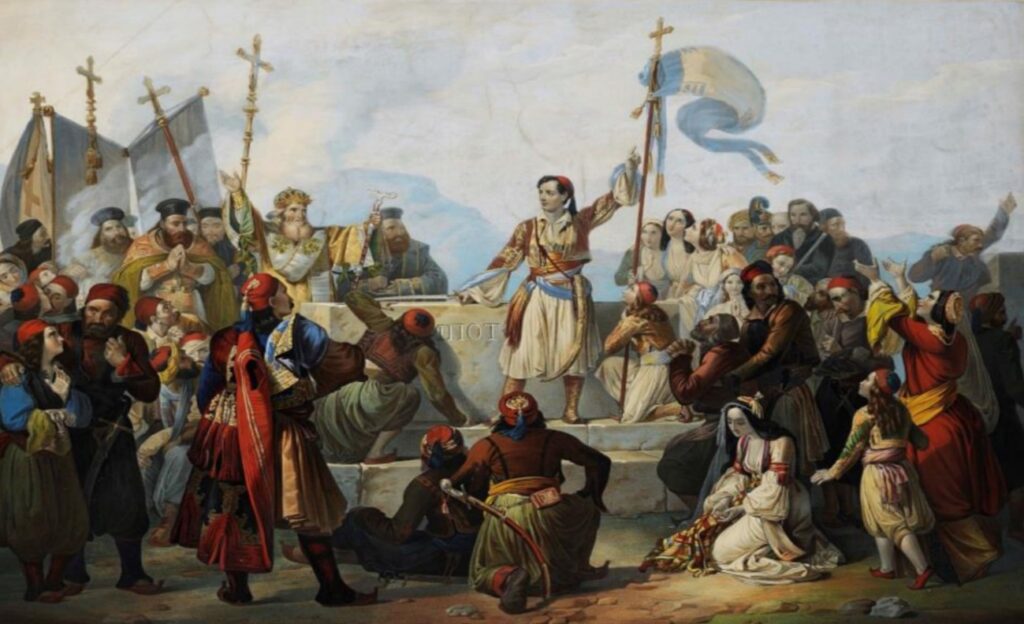A conversation with Stephen Fry, the noted English author, actor, broadcaster, film director and unabashed Philhellene, is never dull. A fact further illustrated when Fry was interviewed by another great Philhellene, David Hill, the Chair of the Australian Parthenon Association, in an online digital conversation held by The Hellenic Initiative Australia on 6 August 2021.
Both men share a passion for Greece and the Greeks and also enjoy a common bond in calling for the reunification of the Parthenon Sculptures looted by Lord Elgin and presently held in the British Museum in London.

What was Stephen Fry’s introduction to Greece?
Fry explained that as a young boy he studied Latin but fell in love with the Greek language when invited by his teacher to learn Greek. The young Stephen felt that he belonged in a special club as he found that Greek is “deep in the DNA” of the English language. The Greek language was also a passport to a magical kingdom.
It is not surprising, therefore, that Stephen Fry’s recently-published trilogy of his own reimagining of Greek myths, Mythos, Heroes and Troy, goes to the heart of Greek mythology which tells the story of Greece itself.
Stephen Fry did not get to Greece until he started university. As he recounted, it was “everything I hoped to see”. And it is a still a thrill every time he goes to Greece.
On the subject of the Parthenon Sculptures which were “ripped” by Elgin, Fry revealed that he was introduced to the cause by the noted writer and contrarian, Christopher Hitchens, who in turn had been influenced by the great Melina Mercouri, Greece’s first Culture Minister and a passionate advocate for the return of the marbles.

According to Fry, people in charge of museums hate the word de-acquisition and fear a slippery slope if artefacts such as the Parthenon Sculptures are returned to their country of origin. The slippery slope argument is simply a fallacy, argues Fry. The real point is that there is something special about the Parthenon in Athens. As a primary element of modern architecture to this day, it is unsurpassed in its grace, its beauty and its achievement. According to Fry “it’s not just a building, it is a foundational element; the very nature of what Athens is”.
Stephen Fry spoke of the “Parthenon Experience” that could be created in the British Museum by making an almost identical cast of the Elgin Marbles and sending the originals, ceremoniously by lorry, train or boat, to the magnificent Acropolis Museum in Athens. The Parthenon Experience would be a magical moment when the sculptures are finally restored to their rightful place and it would be such a classy act on the part of the Britain. In Fry’s view, it’s inevitable anyway.
Stephen Fry marvels at how the Greeks strived for perfection. The Ancient Greek world was majestic, beautiful and remarkable. And so were the Gods. But the world was also cruel, unjust and inequitable and so the Greeks peopled their gods with all those qualities.
One of Stephen Fry’s favourite gods is Hermes (Mercury), quick of silver and the god of storytellers.
He also admires Athena who offered to bestow Paris with wisdom but was edged out by the goddess Aphrodite who instead offered the young prince love in the form of the beautiful Helen of Troy. In Stephen Fry’s mind, Paris chose poorly. And as for the Zeus, at times he acted like a “Mafia Don”.


As it turns out Stephen Fry was heavily influenced by the renown Irish poet and playwright, Oscar Wilde. When Fry first read Wilde’s The Importance of Being Earnest he was immediately taken by the poet’s exquisite poetic use of language and, in particular, the memorable quote “you seem to me to be in every way the visible personification of absolute perfection”. Words of passion that also find their expression in the magnificent Parthenon Sculptures.
Wilde was the “Lord of Language” and a “great Hellenist” whose choice of an artistic life has inspired Stephen Fry who went on to play Oscar Wilde in the film “Wilde” and was moved by the honour and responsibility of that role.

For Stephen Fry, another passionate Philhellene, Lord Byron, was the living embodiment of Hermes. After condemning Elgin’s “monstrous crime”, Byron dedicated himself to Greece and took part in the Greeks’ struggle to shake off the yolk of the Ottoman Empire during the momentous Greek Revolution which started in 1821.
Fry recited Lord Byron’s prophetic words from his satirical poem Don Juan about Greece – my county, my voiceless shore:
The isles of Greece, the Isles of Greece!
Where burning Sappho loved and sung,
Where grew the arts of war and peace,
Where Delos rose, and Phoebus sprung!
Eternal summer gilds them yet,
But all, except their sun, is set.
Not surprisingly, as David Hill pointed out, there are more statues dedicated to Lord Byron in Greece than in England. And those statues will never be torn down.
Stephen Fry emphasised that we can never ever repay Greece: “we will always owe the Greeks more than they owe us.” However, we can make a start by repatriating the Parthenon Sculptures to Greece.
During his conversation Stephen Fry invoked the Greek word thavmazo (θαυμάζω), which means ‘I marvel, I wonder at’, and from which the rather obscure English word thaumaturge, or the rendering of magic and miracles, is derived. The magic of Phihellenism is personified in the likes of Stephen Fry and David Hill.
We salute you both.
- George Vardas is Co-Vice President of The Australian Parthenon Committee
WATCH THI Australian 'In Conversation' with Stephen Fry below.
[su_youtube url="https://youtu.be/hXZErK3Dvjs" width="700" title="THI Australia 'In Conversation' with Stephen Fry"]

